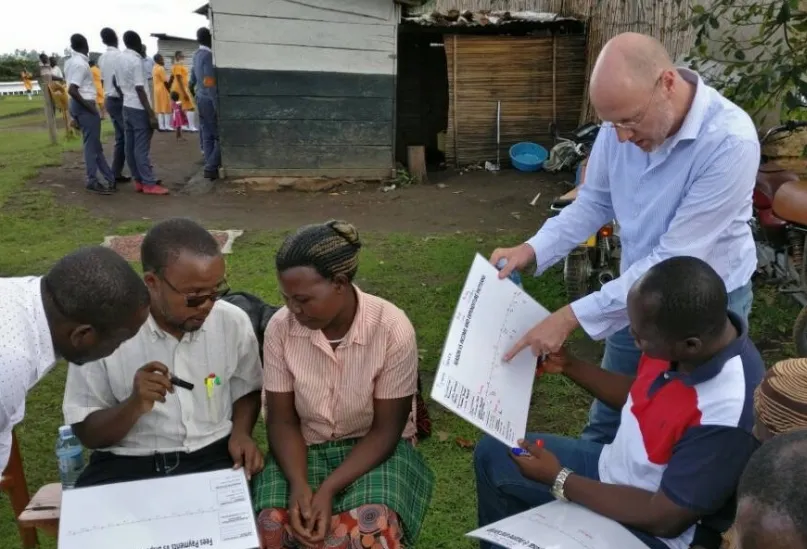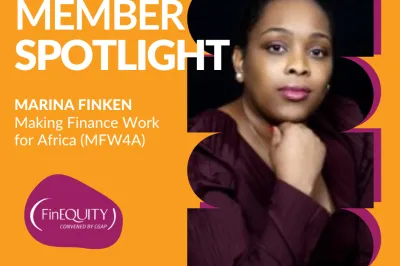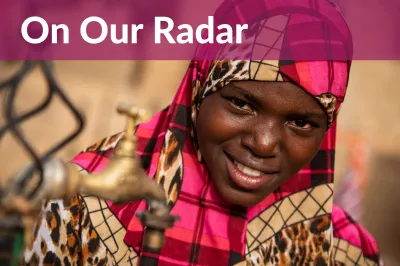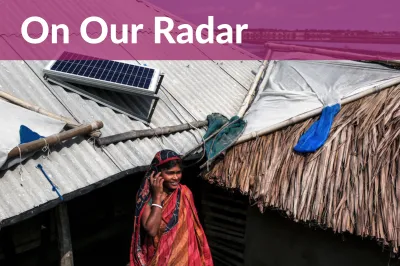Bram Peters, Pacific Financial Inclusion Programme

Thank you for speaking with us Bram, for those FinEquity members who don't know you yet, please tell us briefly what you do.
As Programme Manager for the UNCDF’s Pacific Financial Inclusion Programme (PFIP) I am based in Suva, Fiji. With support from a small team of experts spread out across the region, I oversee the strategic development and implementation of programmes across six Pacific countries.
What does PFIP do, and how does it relate to women’s financial inclusion.
PFIP is a joint initiative from UNCDF and UNDP that started more than a decade ago. We work with both public and private sector stakeholders - such as central banks, ministries, and other government departments. However, in recent years our focus has shifted to spurring innovation in digital financial services and working primarily with private-sector financial service providers, for example, insurance companies, mobile network operators, banks, and pension funds.
What makes this work particularly interesting is that this region presents a unique palette of challenges to overcome when trying to promote financial inclusion, especially when looking to use digital financial services, these include:
- small and dispersed populations,
- concentrated economic activities around a few towns,
- often very limited digital infrastructure,
- very nascent local fintech community,
- challenging gender norms.
Meeting these challenges often requires creative thinking to effectively promote financial inclusion across the entire region. For example, our recently published studies on women’s economic empowerment in Papua New Guinea and Solomon Islands. These studies are part of UNCDF’s wider approach to research on women’s economic empowerment, called PoWER; Participation of Women in the Economy Realized. Under this ‘umbrella’ we have carried out similar studies on access, usage and agency for women’s and girls’ financial inclusion in various other countries, such as Bangladesh, Myanmar, Tanzania, Ethiopia and Senegal.
What attracted you to working in the field of Women's Financial Inclusion?
Ever since I ‘accidentally’ rolled into banking after graduating from university I’ve had a keen interest in microfinance, which later developed into financial inclusion. For me, the various aspects that embody financial inclusion - ranging from digital financial services to financial literacy - are all part of the same set of keys that can unlock socio-economic mobility, something that is all too often taken for granted. For this reason, I enrolled in a Master in Microfinance at the Université Libre de Bruxelles while working on a digital payments project at ING bank in Belgium. When a former colleague then asked if I was interested in moving to PNG to work with him on various digital finance projects at the Bank South Pacific, I’ll admit that I had to think twice as I had a young family, but eventually, we made the move and have never regretted it.
A few years later this new career in financial inclusion led me to FINCA in Africa and thereafter UNCDF in Uganda, before moving back to the Pacific in 2018 to lead the PFIP.
What is the state of women’s financial inclusion in the Pacific - and how does the region differ from other parts of the world when it comes to financial inclusion?
As a region, the average estimated percentage of adults with access to formal financial services is around 41%, which is far lower than both the World and Developing countries peer groups from the Global Findex Database and is similar to that of Sub-Saharan Africa at 43%. While there are a lot of differences between the Pacific and Sub-Saharan Africa, both struggle with challenges in building infrastructure (or digital “rails”) in remote areas and among sometimes isolated populations, although the Pacific may be more profoundly affected by this.
Interestingly though, what we see with respect to women’s financial inclusion in the Pacific is that Tonga and Samoa completely buck the global trend with equal or even better access to accounts for women. This is only present in a few other countries across the world (Argentina, South Africa, Indonesia) and was one of the main reasons for us to do the PoWER studies in Solomon Islands and Papua New Guinea, where there still is a lot of work to do with respect to women’s economic empowerment.
What resources, infrastructure, or other changes would you recommend to improve women’s financial inclusion in the Pacific?
Aside from various other areas, such as digital infrastructure and product development, I believe that literacy will remain of key importance, especially now that more and more digitization is underpinning the developments that are taking place. While a greater number of women have their own phones (and in many cases smartphones), they are often unable to fully benefit from all the features and functionalities these phones offer. This is specifically the case in the more remote rural communities of which we have plenty across the region. For this reason, I am keen to see if we can replicate an initiative from our UNCDF colleagues in Uganda, where they have been piloting and are now scaling the Digital Community Entrepreneur Model, which recruits youth within a local community who have good business acumen and are trusted by the community to become ‘entrepreneurs.’ These youth are then engaged in selling products like phones, airtime and data top-ups, as well as mobile money services, on which they earn commissions, but more importantly they teach their fellow community members how to responsibly use the new digital services that they are getting exposed to.
What role does FinEquity play in your work?
I primarily see FinEquity as a very useful platform for networking and sharing knowledge on women’s financial inclusion. There are a lot of lessons to learn from other practitioners, and too often, I admit, we do not use and incorporate this enough into our work.
Do you have a “success story” you’d like to share?
I am really proud of our on-going partnership with Women's MicroBank in Papua New Guinea. PFIP supported the introduction of kiosk-type outlets called Mama Bank Access Points, which are based closer to where women have their businesses. Many women in the area are illiterate and often use an "X" or "O" as their signature, so the accounts are now biometric-enabled, allowing women to transact using their thumbprint.
One "story" comes from Bibra Ombi who was able to open her first bank account thanks to this program. She shares her experience in this video (at 0:35). (Transcript: I like the way I opened my bank account just last month. They just told me to use the biometric, just get my fingerprint and then they’ll open up my account. So that was the very amazing thing that I realized and I said, “oh this is the nice service.” When I go to other banks they used to tell me “oh you will bring your id photo”, or “you will tell your counselor or your church leader to sign or write a confirmation letter for you to open an account.” But when I came to Mama Bank, they told me that “you don’t need anything to open the account, you just need yourself to come and then we take your fingerprint and then you open the account” and that was the very surprising thing that I noticed. It makes it easier for the mothers that don’t know how to read and write. So now they can just come and get their fingerprints and their money is secure.)
How are you seeing the impacts of COVID-19 on women's financial inclusion in the region?
Personally, I suspect that many of the successes on financial inclusion for women are the most fragile of our achievements to date, and this is not just for the Pacific region but applies across the board. For that reason, I expect that COVID-19 will result in some backtracking of those achievements. However, I am also humbled to see the enormous resilience that women have shown so far despite the enormous economic challenges that their families are going through. And now that many of the men in the families have lost their jobs due to COVID-19 I really hope that it may have a positive influence on women’s agency and as such on financial inclusion.


